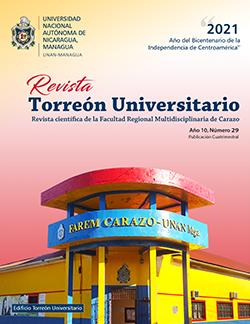Ontological and epistemological aspects of the formation of public servants
DOI:
https://doi.org/10.5377/rtu.v10i29.12732Keywords:
Pedagogy, Ontology, Epistemology, Philosophical positionsAbstract
The present document summarizes the author’s philosophical and, in particular, ontological and epistemological positions concerning to the main theories, approaches and educational paradigms, as well as the process of their development, aims and objectives; This is a proposal for educational intervention to strengthen the processes of comprehensive training of public servants in Nicaragua through the creation of a Government School. In addition, this document presents the main perspectives on the subject of various actors linked to it and proposes the contributions that this topic can make to science and the community.
Downloads
References
Bakunin, M. (1953). Escritos de filosofía política. G. P. Maximoff.
Bunge, M. (2002). Epistemología: Curso de actualización. Siglo XXI Editores.
Córtes, M. (2008). POR UNA NOCIÓN CRÍTICA Y DIALÉCTICA DE CIENCIA. APORTES DE LA TEORÍA MARXISTA PARA LA CONSTRUCCIÓN DE UNA EPISTEMOLOGÍA EMANCIPATORIA. Revista Sociológica de Pensamiento Crítico, 67-72.
De Santos Sousa, B. (2009). Una epistemología del Sur. Ciudad de México: CLACSO y Siglo XXI Editores.
Delval, J. (2012). La escuela para el siglo XXI. Sinéctica: Revista electrónica de educación.
Fierro Celis, F. (2017). Las competencias laborales en el sector púbico: un análisis desde las escuelas de las competencias laborales. Revisión, 92-108.
Galafassi, G. (2002). La teoría crítica de la Escuela de Frankfurt y la crisis de la idea de razón en la modernidad. Contribuciones desde Coatepec, 18-19.
García Carrasco, J. (1993). El concepto de educación y el proceso educacional. Teoría de la Educación.
Hartmann, N. (1965). Ontología. México D.F.: Litoarte.
Hernández Salamanca, O. (2013). La pedagogía socialista en la URSS: fundamentos para la configuración del individuo plenamente desarrollado. Rollos nacionales, 49-60.
Kincheloe, J. (2008). La pedagogía critica en el Siglo XXI: evolucionar para sobrevivir. En M. y. Kincheloe, Pedagogía crítica: de qué hablamos, dónde estamos.
Lorente, P., & Aragón, F. (2012). La evolución de la Teoría Crítica. Reflexiones y digresiones sobre su vigencia para una educación crítica. Con-Ciencia Social, 37-55.
Marx, K., & Engels, F. (1973). Manifiesto del partido comunista. Obras Escogidas en Tres Tomos de C. Marx y F. Engels. Tomo I. Moscú: Editorial Progreso.
Nieto Arteta, L. (1949). Lógica, ontología y gnoseología. Primer Congreso Nacional de Filosofía, (pág. 1182). Mendoza, Argentina.
Organización de las Naciones Unidas para la Educación, la Ciencia y la Cultura. (2018). Guía Abreviada de Indicadores de Educación para el ODS 4.
Organización de Naciones Unidas. (27 de 11 de 2020). Organización de Naciones Unidas. Obtenido de https://www.un.org/sustainabledevelopment/es/education/
Orozco Alvarado, J. (2018). La didáctica de las ciencias sociales.
Orozco, O., & Alonso García, G. (2013). El Islam y los musulmanes hoy. Dimensión internacional y relaciones con España.
Pérez Fardales, E., Pérez Fardales, M., & Mursulí Gómez, D. (2016). La perspectiva marxista de la educación de los valores. Gaceta Médica Espirituana.
Ramos, C. (2015). Los paradigmas de la investigación científica.
Roveda, A. (2010). Los principios fundamentales de la Educación del Siglo XXI. Signo y pensamiento.
Ruíz, L. (2010). Reseña de "PEDAGOGÍA CRÍTICA. DE QUÉ HABLAMOS , DÓNDE ESTAMOS". Revista Interuniversitaria de Formación del Profesorado, 143-146.
Silva, D. (2011). Recuperado el 4 de Marzo de 2021, de https://sites.google.com/site/darjelingsilva/home/paradigma-modelo-enfoque
Villalva, M. B. (1997). La formación y los empleados públicos. REIS.
Published
How to Cite
Issue
Section
License
Copyright (c) 2021 Universidad Nacional Autónoma de Nicaragua, Managua

This work is licensed under a Creative Commons Attribution-NonCommercial-NoDerivatives 4.0 International License.
The authors who publish in this journal agree to the following terms.
- The author or authors of the articles, essays or research grant the National Autonomous University of Nicaragua, Managua (UNAN-Managua) the editing rights (copyright) of the submitted work, therefore the University has the exclusive right to publish the article for the entire copyright period.
- These copyrights/authors authorize Torreón Universitario Magazine and the University to edit and disseminate/publish the article in said Magazine, including printed and electronic reproduction, storage, retrieval and any other type of publication, and sources of secondary information as services. of summaries and databases, they also empower it to protect the article against unauthorized use for dissemination by printed or electronic media (PDF, HTML, EPUB, XML or others).
License for use of content
The magazine uses the Creative Commons Attribution-NonCommercial-NoDerivs 4.0 International License.
Under this statement:

This journal is licensed under a Creative Commons Attribution-NonCommercial-NoDerivatives 4.0 International License. It can be copied, distributed and transmitted publicly as long as the author and source are cited (Revista Torreón Universitario), it should not be modified or used for any commercial purpose. The full license can be found at http://creativecommons.org/licenses/by-nc-nd/4.0/.



